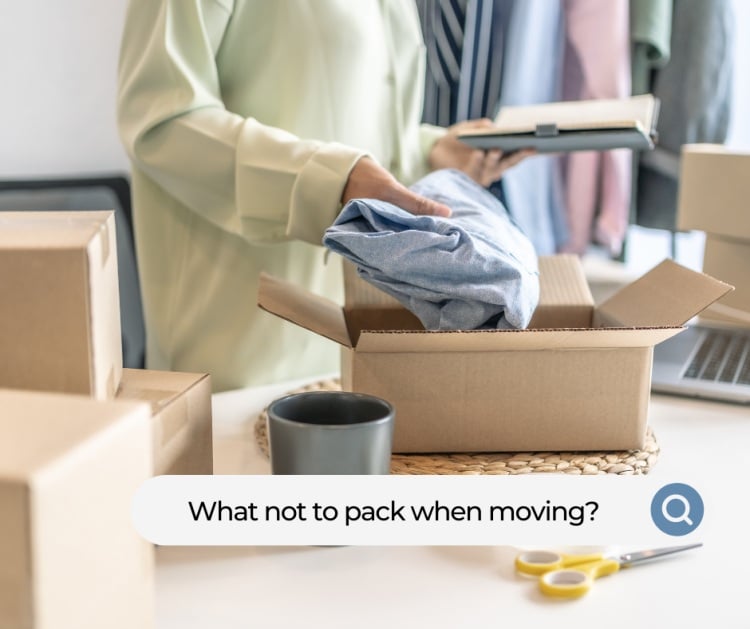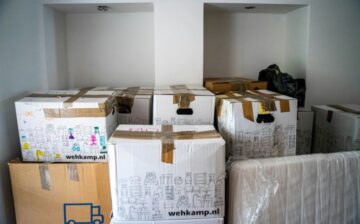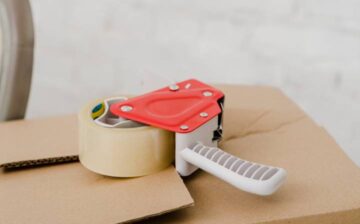
When you’re relocating, one of the big decisions you need to make is what to pack and what not to pack when moving. Some items you should sell or donate. And some cannot be put on the moving truck for safety or regulatory reasons. Moving is often a good opportunity to declutter, to get rid of all of those old items you’ve held on to for years but that have outlived their usefulness.
Sometimes it can be hard to part with things you’ve had around for a long time. But by unburdening yourself of items you won’t need in your new home, you can save a lot of time and hassle before and during the move. What’s more, you could make some cash to help with the move by selling unneeded items.
This post will give you some ideas of what not to pack when moving.
What Not to Pack When Moving
Flammable Materials
Hazardous materials packed in a box and loaded on a hot moving truck can be disastrous. Movers will not accept these items, and unless you’re moving a short distance, it may not be a good idea to carry them yourself. Here is a partial list:
- Gasoline, kerosene, propane, and motor oil
- Paint and paint thinner
- Car batteries or other large batteries
- Nail polish and polish remover
- Charcoal and propane
- Acid
- Household cleaning fluids e.g., bleach, ammonia
- Garden chemicals like fertilizer and pesticides
- Swimming pool chemicals
- Matches and lighter fluid
- Aerosols
- Ammunition, fireworks, and explosives
If you’re moving a lawn mower or similar machinery, drain all fluids out of it before moving.
And, if you’re moving to California or Hawaii, you’ll be required to inspect your belongings and certify in writing that your household goods are free of invasive species, specifically Gypsy Moth and Spotted Lanternfly. Other states and localities have similar regulations. Be sure to check the rules where you’re moving to.
Valuables
Your irreplaceable family heirlooms and documents should be transported more securely than being loaded on a moving truck. No matter how reliable the moving company is, things get lost, accidents happen, and you don’t want to get to the other end and find your box of financial records has gone missing.
Some items to keep out of the moving truck include:
- Moving contract
- Wills, property deeds, and car titles
- Financial, medical, and school records
- Car keys
- Birth certificates, social security cards, and naturalization certificates
- Computers, laptops, tablets, and cell phones
- Valuable jewelry, antiques, and collectibles
- Large amounts of cash
Perishable Foods and Beverages
It’s not pleasant to discard or give away your food items, but it’s better than having a big mess to deal with at the other end. During transport, glass containers may break or explode, bags may leak, and pests may get into your food stash. If you want to carry items from your refrigerator or freezer to your new place, use a cooler instead. To be extra safe, empty your refrigerator and freezer at least the day before moving day, and donate what you can’t carry to a neighbor or a local food pantry, or discard it.
Sealed, dry foods are okay to transport in boxes, though they could get crushed or break open. Sealed beverage cans are also acceptable, but could be dented or damaged.
Daily Essentials
After your household goods are loaded on the moving truck and on their way to your new home, you’ll still need to get dressed, brush your teeth, take your medications, and recharge your phone. It’d be inconvenient to find out these necessary daily items are all in a box somewhere. To keep from having to open each box, keep a separate container of items with you that you’ll need for the first week after moving. To make things even easier, use a clear container to know exactly where everything is.
If you have pets, don’t forget their needs as well. Moving can be stressful for them, too. Keep their favorite foods and toys close by, as these will ease the transition for your pets.
Other Things to Consider Not Packing
Why bring it along if you won’t be using it in your new home? Make things easier on yourself by getting rid of stuff you don’t need before you move – and reduce your moving expenses in the process.
Have difficulty deciding what items to keep? Try making a list of things you’re considering. Note down how often you use it, how hard or expensive it would be to replace, and how valuable it might be to someone else.
Then consider holding a yard sale or advertising some items on Craigslist to get rid of items you’re not using and make a little money. For things that aren’t in salable condition, consider renting a dumpster.
Here are some things that might fall into the “should I keep it or not?” category:
Clothes
Many of us have accumulated more clothing items than we need. And this can become a problem when it’s time to move. It’s way too easy to pack too many clothes. Instead, decide what items you regularly wear or want to keep and donate or sell the rest. Consider the climate and weather in the location you’re moving to when deciding what to keep.
Books and Videos
DVDs and books take up a lot of space and weight when packing. These are great things to donate or try to get rid of in a garage sale.
Computers, Laptops, and Electronic Appliances.
Computers and DVD players also can be bulky and heavy. If you’re not using them, take out the hard drive and donate, sell, or discard the rest at an electronics recycling center.
Documents
Besides critical papers like your marriage license, birth certificates, and financial records, other documents might be just taking up space. Consider scanning them into your computer for archival purposes or simply shredding them.
Bathroom Items
Like clothes, many people have way too much in their bathroom cabinets that are out of date or unused. Consider getting rid of old toothbrushes, half-used toothpaste tubes, and expired nonprescription medications.
Furniture
Furniture can be large and difficult to transport. Moving to a new home may be the time to get some new furniture, finally. Plenty of charitable organizations could give your old sofa, desk, or dining tables a new home, as long as it is still in usable condition.
Garage Stuff
Just like your bathroom, you may have quite a few items in your garage you never use. For insecticides, fertilizer, and other potentially dangerous chemicals, dispose of them safely.
Large Appliances
If your washing machine or refrigerator no longer suits you or won’t be appropriate in your new home, now’s the time to say goodbye and prepare to get a new one. If it’s still working, a local charity would likely be happy to pick it up. This will also lower your moving cost and get your move done faster.
Kitchen Items
Your kitchen is another area where you may have stuff you no longer need or use. Take a look through your kitchen drawers and cabinets. Note what you use regularly and what has just been sitting there. That blender or toaster oven might be perfect for Craigslist or a yard sale.
Bedding
You probably have some old pillows, sheets, and blankets that need to replaced with new ones. Not only will you make more space in the moving truck, but new bedding will be more comfortable in your new home.
Vehicles
You may also want to consider selling the car, truck, trailer, or boat sitting on your property instead of moving it to your new place. You may not need the Jeep in Florida, or the boat in Maryland. This would lower your moving costs even further.
When you’re moving, it’s tempting to put everything in boxes and go. But a little thought and decluttering beforehand can save you time and trouble, and maybe make you some money as well.
We hope you found this blog What not to pack when moving: Expert’s Advice, useful. Check out our post 10 Moving and Packing Hacks for a Stress-Free Move for more great tips!
Have Experience in the Moving Industry? Want an Additional Income Stream? Work With All Around Moving!
Partner with us, moving consultants, and we’ll help you profit. There are no recurring expenses, except purchasing your own leads. We share profits 50-50 with you from all jobs you book with us. Click here to learn more.





